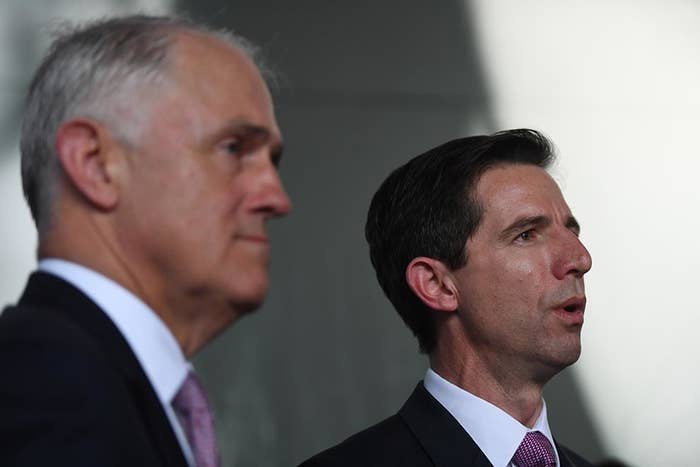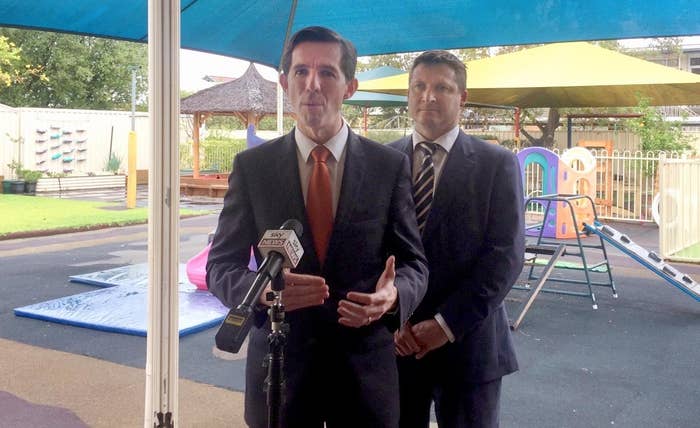Prime minister Malcolm Turnbull and education minister Simon Birmingham won't be making any higher education policy announcements this election.

BuzzFeed News asked the education minister point blank whether he thought it was fair to keep students in the dark this election. Here's what he said ...

"Well we've released a far more detailed paper in terms of higher education policy than anything I've seen from the Labor party.
"Yes, there are a number of areas that require consultation with the sector to be properly finalised and get the structures right, but we've been clear we will drive excellence and innovation in higher education, that we want to provide an opportunity for universities to differentiate and incentivise, but equally that there will not be full fee deregulation and that we can guarantee that for at least 80 per cent of students they will operate under a fixed price regime and nobody will pay a dollar upfront, unlike Labor's vocational education polices that will see people paying upfront for their studies. We won't have that type of upfront payment, especially in the higher education sector.
"We are supporting continued strong funding to universities, but importantly we want to really lift transparency and accountability as well. We're putting more money in to programs that allow universities and force universities to report on student satisfaction, on employment outcomes, on income outcomes from their students so that actually people can make better choices in future about where they go. I think our higher education policies are quite comprehensive, far more comprehensive than Labor's which are just, yet again, a case of committing to spending but little about how to ensure that spending gets the best possible results."
So here at BuzzFeed we thought if the Liberal party isn't going to tell you what their higher education policy is ... we'd go ahead and tell you what's coming:
1. Partial fee deregulation
"For at least 80% of students, they will operate under a fixed price regime and nobody will pay a dollar upfront," Birmingham told BuzzFeed News.
But universities will be allowed to deregulate (i.e. set their own) fees for 20% of their courses from 2018. They'll be called "flagship courses" and will be opt-in.
Universities won't get funding from the government for these courses. As the cost of the degree goes up, the dollar amount the Commonwealth contributes goes down.
To stop the cost of degrees blowing out to $100,000, course fees would be monitored by a group like the Australian Competition and Consumer Commission.
2. Students pay more of their course fees
"University students do get a significant premium in terms of their future earnings potential and it is only reasonable that we assess what is fair for them to contribute," Birmingham said.
Under the HECS loan system, the government pays on average 58% of a student's course fees and the student pays 42%.
The government wants students to contribute more to the cost of degrees, and they'll do this one of two ways:
1. They will change the fee cost ratio - they'll pay 20% less and students will pay 20% more. This means the size of your HECS debt will go up.
2. They will reduce the government grant per student that they give to universities and increase the maximum capped student contribution that institutions can charge.
3. Students paying back their degrees sooner
The government wants students to start paying their debts back sooner. Currently you don't have to pay back your loans until you earn more than $54,126.
There are a few ways they could do this - by lowering the amount you need to earn after graduating to start paying back your debt to as low as $40,000, or by introducing a household income test.
Alternatively, if you earn more than $100,000 you'll have to start making bigger repayments to your HECS loan (the maximum rate is currently 8% for $100,520 and above).
4. Cuts to universities
A 20% cut of $2 billion is still on the table.
"The Budget makes it very clear we still have to find savings in higher education and those savings we discuss in our policy paper could come from reductions in the Commonwealth government subsidy," Birmingham told BuzzFeed News.
5. Charge more interest on HECS loans
This could change the indexation of repayment thresholds from average weekly earnings to CPI.
6. Make it harder for people who aren't working to get HECS
Restricting student loans for people who are "permanently" out of the workforce because it's unlikely they will repay their loans.
7. Collect HECS debts from deceased estates
This means if you haven't paid off your student loans when you die, your family will have to fork out the cash.

